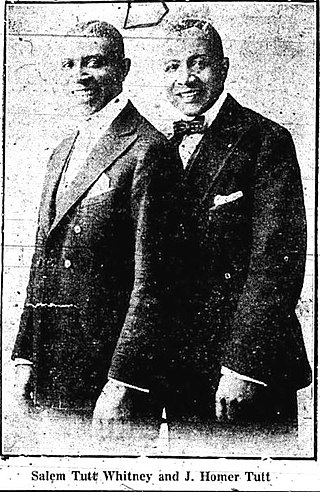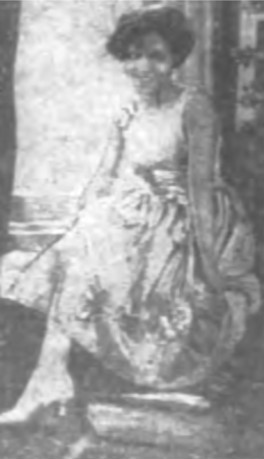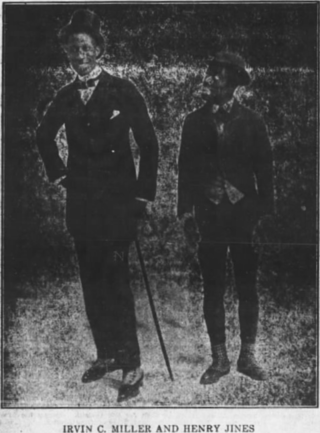Related Research Articles

Salem Tutt Whitney and J. Homer Tutt, known collectively as the Tutt Brothers, were American vaudeville producers, writers, and performers of the late 19th and early 20th century. They were also known as Whitney & Tutt, Tutt & Whitney and the Whitney Brothers. They were prominent in black vaudeville and created over forty revues for black audiences.

Jesse Allison Shipp, Sr. was an American actor, playwright, and theatrical director, who is best remembered as a pioneer African-American writer of musical theater in the United States, and as the author of the book upon which the landmark play In Dahomey was based. Shipp played an influential role in expanding black theater beyond its minstrel show origins and is recalled as perhaps the first African-American director of a Broadway performance.

Alfred Griffin Hatfield was a performer and minstrel show producer as Al G. Field and sometimes Al G. Fields.
Ruth Attaway was an American film and stage actress. Among the films she appeared in are Raintree County (1957), Porgy and Bess (1959) and Being There (1979).

Hilda Perleno was an American blues and jazz singer, known for her Broadway appearances in the 1920s and 1930s.
Jean Starr was an actress, dancer, and trumpeter who became a Chicago society figure after marrying Chicago numbers racket tycoon and Jones brothers, McKissack "Mack" McHenry Jones, and becoming Jean Starr Jones.

Emmett Anthony was a vaudeville comedian who appeared on stage in various revues and shows. In December 1915 he arrived in New Orleans on the S.S. Brunswick to perform at the Iroquis Theater. He was also in the film Son of Satan and was part of Blackville Corporation's 1915 touring revival, The Mayor of Jimtown touring show in 1923, and Harlem Darlings revue in 1929. He featured as a regular at the Crescent Theatre in 1913. He was in Liza in 1923. He received a favorable assessment for his part in Put and Take.
Tommie Moore was an actor in theater, film, and television. She was born Pretty Tomiwitta Moore and shortened her name, though she was sometimes credited as Tomiwitta Moore.
Marion A. Brooks was an actor, playwright, and theater businessman. He partnered on the Bijou theater company at the newly established Bijou Theater in Montgomery, Alabama with players from Chicago. After it folded, he returned to work at the Pekin Theatre in Chicago.

Broadway Rastus was a 1915-1928 revue written by Irvin Miller. It toured for several years at various venues with casts including many successful performers. Miller performed in the show. Other cast members included Esther Bigeou and Henry Jines. Lester Walton reviewed a Philadelphia performance of the show lauding many of the performances and calling the show a diamond in the rough that would benefit from more funding.
Blondie Robinson, also sometimes written as Blondi Robinson, was an African American renowned vaudeville comedic act performer.

Susie Sutton was an American actress who appeared in theater and films. She was a member of the Lafayette Players from 1917 until 1922 before joining productions by I. M. Weingarden from 1922 to 1924. In later theater productions she continued with Weingarden's company troupe until founding her own vaudeville troupe in 1926 called the Susie Sutton Company, though she also took part in productions with the Alhambra Players in the late 1920s. Her role in The Green Pastures in 1930 as Noah's wife is one of her most well known stage roles.
A Trip to Coontown is an American musical comedy. It was performed, directed, and produced by African-Americans. It was written and performed in by Bob Cole and Billy Johnson. and debuted it New Jersey in 1897 before touring in the U.S. and internationally. Its New York City debut was at the Third Avenue Theatre on April 4, 1898.

Edna Belle Alexander (1892–1972) was an American soprano singer and music composer. In addition to performing, she became a songwriter and published music under the name Alex Belledna.
Willis J. Accooe was an American performing musician and composer, mainly of musicals. He was "an important songwriter during the birth of the black musical" according to the Library of Congress website.
Joe Byrd was a vaudeville comedian. He was from Jacksonville, Florida.
George Washington Bullion was a popular and long running three act musical comedy by the Tutt Brothers, Salem Tutt Whitney and J. Homer Tutt that debuted in 1910. Trevor L. Corwell, a white English impresario helped book the show. The storyline featured a black tobacco plantation owner aspiring to join high society. The Tutt brothers’ shows George Washington Bullion Abroad and How Newtown Prepared followed up on the characters in 1915 and 1916. Both shows had the characters of Washington and fellow veterans leaving to fight in foreign wars.
Vivienne Baber was an actress in the United States. She had a starring role in the 1932 film The Black King.
Howard Kelly was a vaudeville and film actor in the United States. He was part of the Pekin Theatre’s stock company. He started in some of William D. Foster’s Foster Photoplay Company films including The Railroad Porter and The Barber.
Sandy Burns was a comedian. He toured on the T.O.B.A. circuit.
References
- ↑ Dietz, Dan (April 10, 2019). The Complete Book of 1920s Broadway Musicals. Rowman & Littlefield. ISBN 9781538112823 – via Google Books.
- ↑ "Lucky Sambo – Broadway Musical – Original | IBDB". www.ibdb.com.
- ↑ Peterson, Bernard L. Jr. (October 25, 1993). A Century of Musicals in Black and White: An Encyclopedia of Musical Stage Works By, About, or Involving African Americans: An Encyclopedia of Musical Stage Works By, About, or Involving African Americans. ABC-CLIO. ISBN 9780313064548 – via Google Books.
- ↑ "The Theatre: New Plays: Jun. 15, 1925". Time. June 15, 1925 – via content.time.com.
- ↑ "Site Map - June 8, 1925". The New York Times– via NYTimes.com.
- ↑ "The Yale Daily News 7 December 1925 — Yale Daily News Historical Archive". ydnhistorical.library.yale.edu.
- ↑ Peterson, Bernard L. Jr. (October 25, 1993). A Century of Musicals in Black and White: An Encyclopedia of Musical Stage Works By, About, or Involving African Americans: An Encyclopedia of Musical Stage Works By, About, or Involving African Americans. ABC-CLIO. ISBN 9780313064548 – via Google Books.